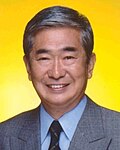| ||||||||||||||||
| Turnout | 54.35% | |||||||||||||||
|---|---|---|---|---|---|---|---|---|---|---|---|---|---|---|---|---|
| ||||||||||||||||
| ||||||||||||||||
The 2007 Tokyo Gubernatorial elections were held on April 8, 2007 as part of the 16th unified local elections. There were fourteen candidates, among them the incumbent governor Shintaro Ishihara. Most candidates, with the exception of Kurokawa and Yamaguchi, ran as independents, [1] but some were supported by various parties.

